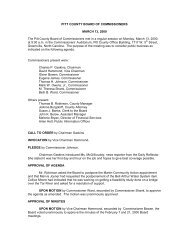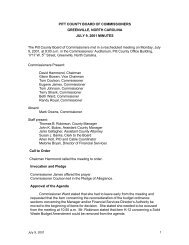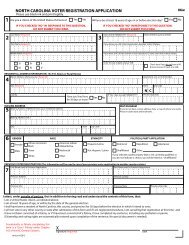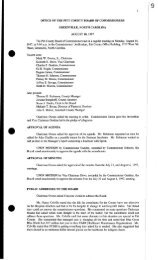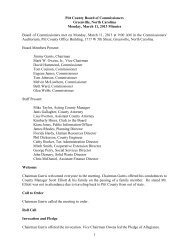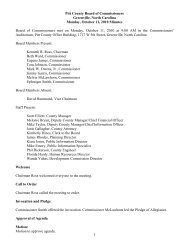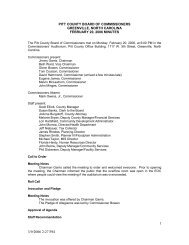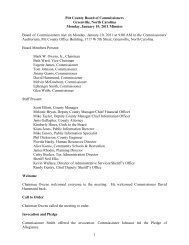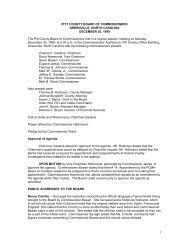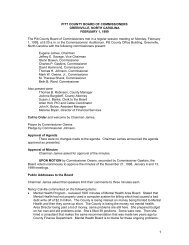2030 Comprehensive Land Use Plan - Pitt County Government
2030 Comprehensive Land Use Plan - Pitt County Government
2030 Comprehensive Land Use Plan - Pitt County Government
- No tags were found...
You also want an ePaper? Increase the reach of your titles
YUMPU automatically turns print PDFs into web optimized ePapers that Google loves.
held a workshop with ground water users from the Central Coastal Plain in Greenville toreview the monitoring data and discuss what responses should be made to assure asustainable water supply for the Coastal Plain region of the State. Based on discussionswith water users and available scientific data, the State developed the following threepoint program to assure good ground water management in the Coastal Plain:1. MonitoringAn adequate ground water level monitoring network needs to be established,operated, maintained, and improved as necessary to provide accurate data on theamount and rate of ground water level declines in the Central Coastal Plain. Thisinformation is needed to guide management efforts to avoid damage to theaquifers and also to track progress in reversing water level declines throughimproved management.2. <strong>Plan</strong>ningThe solution to the water supply problems in the Central Coastal Plain will involvecareful management of ground water to use sustainable yield while developingadditional water sources to meet needs beyond those which can be met fromground water resources. Communities in the Central Coastal Plain have a number ofoptions for additional or augmented water supply sources, including surface water,use of aquifers which are less stressed, water conservation, water re-use, andaquifer storage and recovery. Local government 20-year water supply plansdeveloped in 1998 will be used to provide an indication of the degree to whichsustainable water supply plans are being developed.3. RegulationThe Water <strong>Use</strong> Act of 1967 provides a basis for regulating water withdrawals bypermit in areas where water use is exceeding the capacity of water supplies. TheWater <strong>Use</strong> Act offers a method of preventing damage to the aquifers and ofassuring that all water users have predictable and fair access to water supplies.Reason for Establishing the CCP Capacity <strong>Use</strong> AreaEvidence of present and future ground water supply shortages exists within the areaencompassed by 15 North Carolina counties: Beaufort, Carteret, Craven, Duplin,Edgecombe, Greene, Jones, Lenoir, Martin, Onslow, Pamlico, <strong>Pitt</strong>, Washington, Wayneand Wilson. Within these counties, ground water from the Black Creek and Upper CapeFear aquifers is being withdrawn at a rate that exceeds the available recharge.Water levels in the Black Creek and Upper Cape Fear aquifers have been declining sincethe late 1960s. The decline in ground water resources - from free-flowing wells to waterlevels as much as 200 feet below land surface - indicates that current withdrawals ofwater from these aquifers exceed the available supply that can be used on a sustainablebasis. Regulating the use of water in this area fulfills the intent of the Water <strong>Use</strong> Act of1967 to protect the resource from depletion and to allow water uses that can besustained into the future.<strong>2030</strong> <strong>Comprehensive</strong> <strong>Land</strong> <strong>Use</strong> <strong>Plan</strong> Appendix A: Inventory and Analysis<strong>Pitt</strong> <strong>County</strong>, North Carolina A-69






